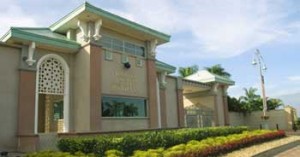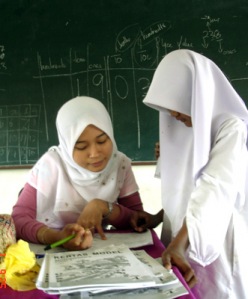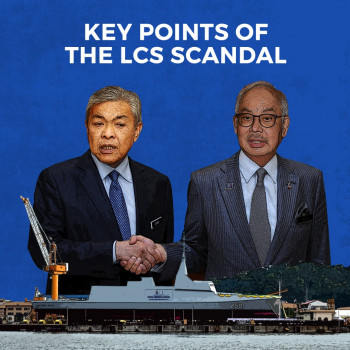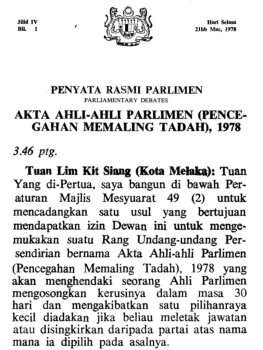Thirty-year-old marketing executive Johan’s life hasn’t changed since Prime Minister Najib Razak rolled out BN’s “big is better” Budget 2011, best remembered for announcing the 100-storey Warisan Merdeka tower. Like many young working adults, the only house Johan can afford on his current salary is a two-room flat that would entail an hour-long daily commute to his workplace. Johan and his girlfriend are saving to get married, if their parents cannot chip in to pay for the down payment for a modest matrimonial home, the new couple will have to move in with their parents, or rent.
A year has passed since Najib’s polite fiction has failed to uplift the standard of ordinary joes like Johan, despite throwing RM212 billion in a bid to revive the waning economy. The danger signs are now imminent for history to repeat itself as Najib -fresh from his triumphant ISA bait-and-switch stunt- prepares to announce Budget 2012.
 Seri Perdana Seri Perdana
Upkeep for the official residences of the prime minister, deputy prime minister and ministers in the Prime Minister’s Office (PMO) cost RM3.4 million |
We’ve been there, seen that. Clearly, some wizardry is needed to elevate the lives of Johan and millions of ordinary Malaysians. With the 13th General Election looming, this is an ideal moment for Pakatan Rakyat to get radical with its alternative budget.
PR’s alternative budget for 2012, soon to be announced in anticipation of PM Najib Razak’s budget tabling on October 7th -focuses on getting better value for your ringgit.
|
Malaysia’s bottom 40% income earners take only 15% of total household income. Whereas the top 20% of households reap nearly half of total household income. |
Reckless government overspending
While the many Malaysians like Johan struggle to battle soaring expenses, the government’s notorious overspending and bloated operating expenditure is bleeding the national coffers dry.
According to think tank REFSA, 2011 is the 13th consecutive year of government overspending. The formal term for this ill judgment is the more innocent-sounding “deficit”. In fact, since 1969, there have only been five surplus budgets – the rest recorded deficits.
With the government consistently spending more than its income, the total amount of government overspending for the past 13 years has reached an estimated RM290 billion. This is equivalent to RM10,000 for each Malaysian! However, the impact felt from this generous expenditure has been minimal to the man on the street. Where has all our money gone?
| The richest 10% in Malaysia control 38.4% of economic income as compared to the poorest 10% who control only 1.7%. This simply points to the fact the country’s wealth is increasingly concentrated in the rich.
Source: UNDP Human Development Report 2009 |
Spending… on what?
PR believes it is necessary to reframe the debate from focusing on “spending” to delivering “value” with each ringgit spent. In order to maximize value, PR is committed to cutting down irresponsible spending and reducing wastage.
We should not forget easily the shock the nation suffered when it was discovered that RM1.8million worth of taxpayers’ money was used to pay for a free Facebook page to promote the Ministry of Tourism. Or the Auditor General’s report bringing to light the unjustified expenditure of RM42,320 for a laptop— perhaps the most expensive in the world.
Taking a leaf out of the successful financial management of the four PR state governments, PR’s national alternative budget trains its sights on ineffective spending.
Penang, recently praised in The Economist magazine, has been recording surplus budgets since PR took over in 2008, with cost savings amounting to RM20 million annually. In 2011 the Selangor state government increased its cash reserves to RM1.1 billion, the best ever record for the state. Kedah too registered revenue increase for 3 consecutive years since coming under PR rule.
| 40% of Malaysians earn less than RM1,500 per month, three quarters of these are bumiputera
|
Focus on people, not projects
A key thrust of PR’s Alternative Budget 2012 is to empower Malaysians and uplift dignity for all.
For budget expenditure to deliver more value, the alternative budget seeks to focus on projects that benefit people, not cronies. Given the economic slowdown, total spending will be responsibly maintained at RM220 billion. But effective spending will be increased by 20%.
This requires bold and reform-minded policy initiatives. By trimming out white elephant mega projects aimed to enrich fat cats, the direct savings can be channeled where it makes the most difference.
Proposed budget cuts
|
Blanket subsidies favor the rich
The existing subsidy policies are deeply flawed. The government spends up to RM25 billion annually on subsidies. That’s equivalent to more than RM2,000 per month for the poorest 1 million Malaysian households. But why are Malaysians still feeling the pinch?
The bulk of this RM25billion is burnt to pay for blanket subsidies, which tend to benefit the rich far more than the poor. For instance, the Porche driver is a bigger beneficiary of petrol subsidies as  compared to the Proton Saga driver. Besides fuel, flour, sugar, and other items are universally subsidised for Malaysians of all income levels.
compared to the Proton Saga driver. Besides fuel, flour, sugar, and other items are universally subsidised for Malaysians of all income levels.
In order to reach the people who need it most, subsidies should be redirected to target the poor. According to PR’s estimate, if the present subsidies are properly targeted and implemented, the poorest 1 million Malaysian households would receive more than RM25,000 per year.
A more efficient welfare system has to be put in place. Besides public provision for healthcare and education, some basic quality of life has to be provided for all citizens. This is especially pressing in this tough economic time. The alternative budget strives to ensure that poverty does not rob the citizens of Malaysia the opportunity to their well-being that they deserve.
Other expected areas of concern in the Alternative Budget include open-tender procurement policy to reward innovation and productivity, nurturing civil service excellence and reducing red tape, reviewing lop-sided concessions to improve competitiveness, a proposal for “build, then sell” housing, as well as fiscal decentralization.
The Alternative Budget 2012 will be a unique policy document showcasing PR solidarity and stands as an expression of confidence by all PR parties towards its common policy platform. Given the diverse economic ideologies held by component parties, coming to agreement on a subject as monumental as the national budget is both a triumph and omen that bodes well for greater PR cooperation.
Moving forward from Buku Jingga and riding at the back of fresh unity forged in the Bersih 2.0 fight for electoral reforms, the newly strengthened coalition flexes its wings and tries on the actual task of governing for size. As polls loom, consolidation is paramount for the coalition. The voters are watching, and they would welcome robust economic reform, something which Najib has so far failed to deliver. –The Rocket







